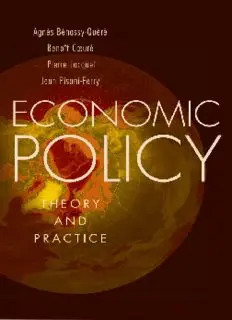
Economic Policy: Theory and Practice PDF
Preview Economic Policy: Theory and Practice
Economic Policy This page intentionally left blank Economic Policy Theory and Practice AgnèsBénassy-Quéré,BenoîtCœuré, PierreJacquet,andJeanPisani-Ferry 3 2010 3 OxfordUniversityPress,Inc.,publishesworksthatfurther OxfordUniversity’sobjectiveofexcellence inresearch,scholarship,andeducation. Oxford NewYork Auckland CapeTown DaresSalaam HongKong Karachi KualaLumpur Madrid Melbourne MexicoCity Nairobi NewDelhi Shanghai Taipei Toronto Withofficesin Argentina Austria Brazil Chile CzechRepublic France Greece Guatemala Hungary Italy Japan Poland Portugal Singapore SouthKorea Switzerland Thailand Turkey Ukraine Vietnam Copyright©2010byDeBoeck&Larciers.a.,2004,1eédition EditionsDeBoeckUniversité RuedesMinimes39,B-1000Bruxelles,Belgium AgnèsBénassy-Quéré,BenoîtCoeuré,PierreJacquet,JeanPisani-Ferry Politiqueéconomique PublishedbyOxfordUniversityPress,Inc. 198MadisonAvenue,NewYork,NewYork10016 www.oup.com OxfordisaregisteredtrademarkofOxfordUniversityPress Allrightsreserved.Nopartofthispublicationmaybereproduced, storedinaretrievalsystem,ortransmitted,inanyformorbyanymeans, electronic,mechanical,photocopying,recording,orotherwise, withoutthepriorpermissionofOxfordUniversityPress. LibraryofCongressCataloging-in-PublicationData [Politiqueeconomique.English] Economicpolicy:theoryandpractice/AgnèsBénassy-Quéré... [etal.]. p.cm. Includesbibliographicalreferencesandindex. ISBN978-0-19-532273-6 1. Economicpolicy. I. Bénassy-Quéré,Agnès. HD87.P655132010 330—dc22 2009054348 9 8 7 6 5 4 3 2 1 PrintedintheUnitedStatesofAmerica onacid-freepaper Foreword ThisbookisabookIwouldhavelovedtowrite.IndeedthisisabookIlong wanted to write. I wanted to do so out of guilt. For a long time, I have felt thatmygraduatetextbookwrittenwithStanFischersentthewrongmessage. Wehadmadethechoicetopresentmodelsandtheirlogic,ratherthantheir applications.Thejustificationwasaperfectlygoodone,namelythatwewanted toshowtheintellectualstructureofmacroeconomictheoryfirst.But,defacto, the lack of serious empirics sent another message: That theory was largely divorcedfrompractice,andfromfacts.Thatmessageiswrong:Theorywithout factsismuchtooeasy,andofverylittleuse.Ialsowantedtowritesuchabook outofadesiretosharewithstudentsmyexcitementaboutmovingbetween theory,facts,andpolicy.Itistraditionaltodosoinundergraduatetextbooks, at least in the United States. Those textbooks are full of discussions about policydebates—abouttheeffectsofpolicychoicesontheeconomy.Ithought itwouldbeevenmorefuntodosowithgraduatestudents,whohavemore tools,boththeoreticalandeconometric,attheirdisposal. AgnèsBénassy-Quéré,BenoîtCœuré,PierreJacquet,andJeanPisani-Ferry havebeatenmetoit.Iamhappytheydidso,becausetheyhavedoneabetter jobthanIcouldhavehopedto. Togiveasenseofwhattheyhaveachieved,Ishalltakeoneexample,the creationorreformoffiscalframeworksliketheEuropeanStabilityandGrowth Pact(SGP).Tocometoanintelligentsetofrecommendations,thinkofallthe elementsyouneedtoputtogether: • Youneedtounderstandwhatsustainabilitymeansintheoryandin practice,whatthecostsofnotabidingbysustainabilityare,andhowto vi Foreword assesssustainability.Whendoesadebt-to-GDPratiobecometruly excessive?Whathappensthen?Howfastcanyoureachthatthreshold? Howfastcanyoumoveawayfromit? • Youneedtounderstandthelong-termeffectsofdeficitsanddebton outputanditscomposition.Howdodeficitsanddebtaffectoutputin themediumandthelongrun?Howdotheyaffecttheinterestrate,the netforeigndebtposition,thecapitalstock?Whatisthecostinterms oflostconsumptioninthefuture?Whichgenerationsgain,which generationslose? • Youneedtounderstandtheshort-termeffectsofdeficits,andhow counter-cyclicalfiscalpolicycanhelpintheshortrun.Dodeficitsaffect activityinthesameway,whethertheycomefromtaxcutsorspending increases?Howimportantareexpectationeffects?Cantheanticipation oflargedeficitsinthefutureleadtoadecreaseinconsumptionand investment,andadecreaseinoutputtoday?Whenisthismorelikely tohappen? • Youneedtounderstandthemacroeconomiccostsofdecreasedpolicy flexibility.Areconstraintsondeficitsanddebtconsistentwithan appropriateresponseoffiscalpolicytoshocks?Whatexplainssustained divergenceswithintheeuroareaduringthefirst10years?Weresuch divergencesavoidable?Thenyouneedtodeterminewhetherandto whatextentfiscalpolicyistherighttooltodealwithcountry-specific shocks,andtowhatextentitcan(should)substituteforthelackofan independentmonetarypolicy.Finally,youneedtofigureouthowmuch policyspaceislefttogovernmentsaftertheyhavefoughtthenewgreat recessionandrescuedtheirbanks. • Youneedtothinkabouthowtodefinetherulesinpractice.How shoulddebtbedefined?Howshouldimplicitliabilities,comingfrom socialsecurityandotherpromisestofuturegenerations,betreated? Ifrulesaredefinedintermsofdeficitsanddebt,whatarethemost appropriatedefinitionsofthetwoconceptsforthequestionathand? Howshouldrulesdealwithprivatizationrevenues?Shouldrules applytogrossdebtortonetdebt?Shouldthebudgetbeseparated betweenacurrentaccountandacapitalaccount?Shouldthedeficit rulesapplyonlytothegovernmentcurrentaccount?Shouldrulesbe enforcedbypoliticiansorbyindependentcommittees? • Youneedtothinkaboutpolitical-economyissues.Whyarerules neededinthefirstplace—toprotectpeoplefromtheirgovernments,or toprotectthegovernmentsfromthemselves?Howcanaparticularsetof rulesbemanipulatedordistortedbyanationalgovernment?Howwill sanctionsagainstamisbehavinggovernmentbeimposed?Willthese sanctionsbecredibleexante?Isinternationalcoordination,suchas intheG20framework,anadvantageoradiversionfromevery government’sduties? Foreword vii Toanswerthesequestions,youneedmanyconceptualtools.Amongthem are: A dynamic general equilibrium model with overlapping generations; a model of short-run fluctuations with careful treatment of expectations; political-economymodelstothinkaboutthecaseforrules;agencymodelsto helpyouthinkaboutthedesignofspecificrules.Ineachcase,withguidance fromtheory,youneedtolookattheevidence,soastogetasenseofwhich theoreticalargumentsaremorerelevant.Thisisnoteasytodo.Courseswill typicallygiveyouthetheoreticaltools,withoutmuchincentivetoapplythem, andleaveyoutousethemonyourown,withoutmuchpracticaltraining.This isnotwhatthisbookdoes.Itmotivatesyoutousetools,givesyouthetools, andshowsyouhowtheycanbeemployed. Last but not least, this book is among the very first that offer students arigorousandcomprehensivetreatmentofthefinancialcrisisandthegreat recessionthatfollowed.Theauthorsdonottrytocastaveilovertheconceptual difficultieseconomistsfacewhentheyreflectonthecausesofthecrisis,onthe limitationsoftraditionalapproachesthatthecrisishasuncovered,andmaybe the excessive faith in theory, and on the need for more theoretical work to understandbetterthecrisisandmakesureitdoesnothappenagain.Butthey do not throw the baby out with the bath water and claim that economists have“mistakenbeautyfortruth,”aswassuggestedbyPaulKrugman.Onthe contrary, they show how existing theories can be used, cross-fertilized, and placedinahistoricalcontexttounderstandthecrisisbetter.Thisistheway forward. In short, this book trains you to be a good macroeconomist—a good economist.Itinstillstherightattitude,andgivesyoutherightmethodology: Tobuildsolidlyontheory,tousethetheorytolookatthedata,andthento go back and forth between the two until a coherent picture forms. As I was readingthebook,Ifeltagaintheexcitementthatcomeswithdoingresearch onmacroeconomics.Ihopethisexcitementiscontagious,andIwishyoua verygoodread. OlivierBlanchard MassachussettsInstituteofTechnologyand InternationalMonetaryFund This page intentionally left blank Preface This is a book for all those interested in what shapes, or should shape, economic policy: The major stylized facts that capture the messages from history; the theories that help us understand these facts and represent the impactofpolicydecisions;thecontroversiessurroundingpolicychoices;the institutionsthatcontributetodeterminingthem;and,lastbutnotleast,how experience,theories,andinstitutionsinteract. We have been teaching the material that forms the basis of this book in a graduate seminar at the École Polytechnique in Paris since 1998, and also at Sciences Po, École Normale Supérieure, École des Ponts–ParisTech, and Université Paris-Dauphine. In 2004 a first book in French arose from this experience,followedbyasecondeditionin2009.ThisEnglisheditionpresents completelyrevisedmaterial,drawingonourexperiencewithpreviouseditions andonthepolicylessonslearntintherecentglobalcrisis. Preconditionsforusingthisbookarelimited,becausewestartfromfacts, introducetheoriesasneeded,andkeepformulasinboxes.Practitionersand observers will find what they need to understand actual policy issues and discussions.However,graduatestudentsmorefamiliarwithmodelswillalso learnhowtolinkleading-edgeresearchtoconcretepolicydevelopments. Thisbookalsoaimstoeschewculturalbias.Ouranalysisstartsfrompolicy questionsinEurope,theUS,andtheemergingworld,andourexamplesare takenfromaroundtheworld.
